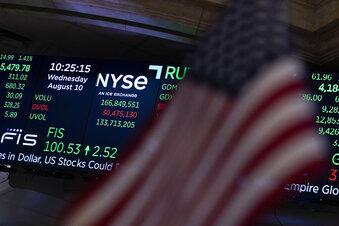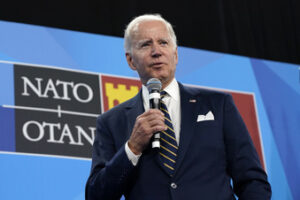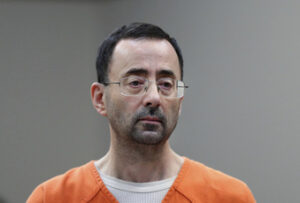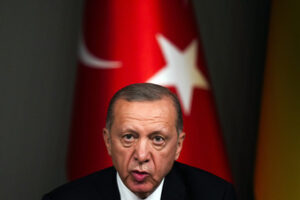Stocks open lower on Wall Street, adding to recent losses
3 min read
FILE - A screen displays market data at the New York Stock Exchange in New York, Wednesday, Aug. 10, 2022. Stocks are holding steady in the early going on Wall Street, Friday, Aug. 26, ahead of a widely anticipated speech by the head of the Federal Reserve that's expected to yield more clues on the central bank's outlook on the economy, inflation and interest rates.(AP Photo/Seth Wenig)
NEW YORK (AP) — Stocks are opening lower on Wall Street, continuing to add to their losses following a drop last week as traders realized how determined the Federal Reserve is to keep interest rates high to fight inflation.
Technology companies and banks had some of the biggest losses in the early going Monday. This week investors will get more updates on the economy including the government’s monthly jobs report on Friday and a reading on consumer confidence Tuesday from the Conference Board. European markets were also lower and Asian markets closed lower overnight. Treasury yields were higher.
THIS IS A BREAKING NEWS UPDATE. AP’s earlier story follows below.
NEW YORK (AP) — U.S. markets pointed toward more losses hours before the opening bell Monday after the chairman of the U.S. Federal Reserve indicated high interest rates will continue for some time to curb inflation.
Futures for the Dow Jones industrials slid 0.9% and futures for the S&P 500 tumbled 1%.
Markets in Asia and Europe also lost ground following a dreadful week on Wall Street, where the Dow Jones Industrial Average ended the week down more than 1,000 points.
France’s CAC 40 dropped 1.8% in early trading, while Germany’s DAX lost 1.3%. Britain’s FTSE 100 shed 0.7%
The message from Federal Reserve Chair Jerome Powell in a speech Friday had been expected, though some hoped it would be less emphatic.
“The market apparently was looking for something a little more neutral. After all the talk of a ‘pause’ and ‘pivot,’ none of which ever made any sense with a Fed that has said several times it will keep hiking rates even if it means some economic pain, we are back to square one with a Fed outlook to keep tightening,” said Clifford Bennett, chief economist at ACY Securities.
“The Fed was always going to keep raising rates aggressively, but the market decided to price in a slowing in hikes, and even a reversal.”
Japan’s benchmark Nikkei 225 dipped 2.7% to finish at 27,878.96. Australia’s S&P/ASX 200 dropped 2.0% to 6,965.50. South Korea’s Kospi slipped 2.2% to 2,426.89. Hong Kong’s Hang Seng slid 0.7% to 20,023.22, while the Shanghai Composite recouped earlier losses and edged up 0.1% to 3,240.73.
“The risk-off mood is playing out in the Asia’s session today as well, as bearish sentiments follow through with the sell-off in Wall Street to end last week while U.S. futures continue to suggest no reprieve into the new week,” said Yeap Jun Rong, market strategist at IG in Singapore.
Also weighing on regional sentiments are Chinese economic data over the weekend, which seem to indicate a strong recovery will take time. China’s January-July industrial profits sank 1.1% from a year ago amid fresh COVID-19 restrictions.
Powell spoke last week at an annual economic symposium in Jackson Hole, Wyoming, that has been the setting for market-moving Fed speeches in the past.
He said the Fed will likely need to keep interest rates high enough to slow the economy “for some time” in order to beat back the high inflation sweeping the country. The Fed has already hiked its key overnight interest rate four times this year in hopes of slowing the worst inflation in decades.
Higher rates help corral inflation, but they also hurt asset prices. Powell acknowledged the increases will hurt U.S. households and businesses, in perhaps an unspoken nod to the potential for a recession. But he also said the pain would be far greater if inflation were allowed to fester and that “we must keep at it until the job is done.”
In energy trading, benchmark U.S. crude rose 13 cents to $93.19 a barrel. Brent crude, the international standard, added 11 cents to $99.12 a barrel.
In currency trading, the U.S. dollar rose to 138.60 Japanese yen from 137.75 yen. The euro was little changed at 99 cents.






